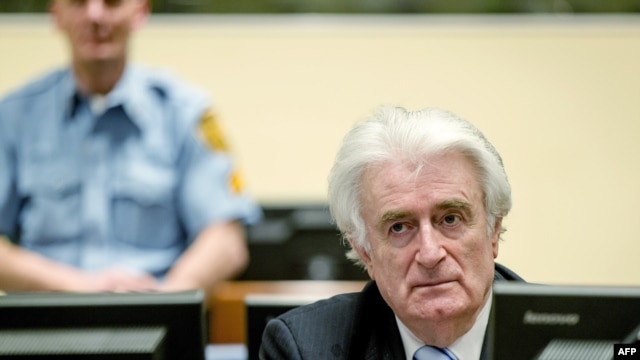Serbia accuses Hague war crimes court of bias, selective justice
| Publisher | Radio Free Europe/Radio Liberty |
| Publication Date | 26 March 2016 |
| Cite as | Radio Free Europe/Radio Liberty, Serbia accuses Hague war crimes court of bias, selective justice, 26 March 2016, available at: https://www.refworld.org/docid/5768ffa46.html [accessed 21 May 2023] |
| Disclaimer | This is not a UNHCR publication. UNHCR is not responsible for, nor does it necessarily endorse, its content. Any views expressed are solely those of the author or publisher and do not necessarily reflect those of UNHCR, the United Nations or its Member States. |
March 26, 2016
 Bosnian Serb wartime leader Radovan Karadzic sits in the courtroom for the reading of his verdict at The Hague on March 24, 2016.
Bosnian Serb wartime leader Radovan Karadzic sits in the courtroom for the reading of his verdict at The Hague on March 24, 2016.
Serbia complained that the United Nations war crimes tribunal that convicted Bosnian Serb leader Radovan Karadzic of genocide is biased against Serbs.
The court's verdict on March 24 left a "bitter taste because no orchestrators of the policies of crimes against Serbs have been punished," Serbian Justice Minister Nikola Selakovic said after a cabinet session on the Karadzic decision on March 25.
"The Serbian government believes that the justice of punishing members of only one nation for the crimes which were committed by all is in fact selective," he said, adding that the verdict appears "politicized."
Despite bitterness about the one-sided caseload of the court, Serbian leaders said they will continue to work for reconciliation and pursuing membership in the European Union.
The government of the Bosnian Serb Republic, which Karadzic helped to found, also criticized the verdict on March 25, saying it "does not contribute to reconciliation and trust-building among the peoples" of the former Yugoslavia.
Karadzic was sentenced to 40 years in prison for orchestrating atrocities against Muslims and Croats in Bosnia during the 1992-95 war, including the massacre of some 8,000 people in Srebrenica.
Based on reporting by AP and Reuters
Link to original story on RFE/RL website
